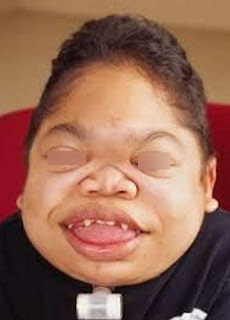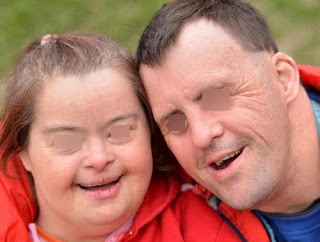What is a hurler syndrome?
A hurler syndrome is a medical condition caused by a deficiency in alpha-L-iduronidase, an enzyme that breaks down mucopolysaccharide molecules. An absence of this enzyme causes abnormal accumulation of mucopolysaccharide in the body.The condition is sometimes called hurler-Scheie syndrome because of the two clinical subtypes: Hurler syndrome and Scheie syndrome. (1, 2, and 3)
picture 1: Clinical manifestations of a child with a Hurler syndrome.
image source: oncofertility.northwestern.edu
picture 2: A patient living with a Hurler syndrome.
image source: armagen.com
picture 3: The photo showing the inheritance pattern of Hurler syndrome.
image source: i.ytimg.com
picture 4: The classic manifestations of Hurler syndrome.
image source: gstatic.com
picture 5: A photo of adult patients with Hurler syndrome.
image source: wisegeek.com
Hurler syndrome symptoms
- heavy eyebrows
- broad forehead
- broad nasal tip
- the skull is large and deformed
- enlarged lips
- small stature (4)
- thick skin
- hernias
- corneal opacity
- heart defects
- hirsutism
- enlargement of the liver and spleen
- thoracic-lumbar kyphosis
- progressive mental degeneration (3)
What causes hurler syndrome?
It is caused by IDUAgene mutation causing alpha-L-iduronidase enzyme deficiency. (4, 5)What is the prevalence rate?
Hurler's syndrome is an extremely rare condition, with a ratio of one in every 100,000 population. (4, 5)Hurler syndrome treatment and management
picture 6: It is one of the early treatment approaches for patients with Hurler syndrome.
image source: jamanetwork.com
picture 7: An enzyme replacement therapy helps manage the signs and symptoms of Hurler syndrome.
image source: i.pgu.me
picture 8: A hurler syndrome patient receiving palliative care.
image source: pinimg.com
Treating and managing hurler syndrome require a multidisciplinary approach. The treatment and management approach primarily depends on the patient's age and overall condition of the patient. Commonly used treatment methods are as follows:
- Hematopoietic stem cell transplantation (HSCT) - It is the treatment of choice for patients 2 years old and below. It is extremely helpful in prolonging the patient's ability to survive. It is a must to perform HSCT in the early stage of the disease.
- Enzyme replacement therapy - It is a life-long therapy for patients with Hurler syndrome. Its purpose is to alleviate non-neurologic symptoms.
- Bone marrow transplant - It helps slow down the progression of the disease. As a matter of fact, it is helpful in preventing mental retardation when given in the early stage of the disease.
- Other treatment approaches include supportive and palliative care such as speech therapy, physical therapy, respiratory support, pain medication, hearing aid, and the likes. All this to significantly improve the quality of life. (5, 6, 7, and 8)
Hurler syndrome life expectancy
Those with mild Hurler syndrome have a normal lifespan. People with moderate Hurler syndrome have a lifespan of teenage years to early adult for as long as symptoms are managed properly. People with severe Hurler syndrome seldom reach 10 years of life. They die of cardiac and respiratory complications.People with Hurler syndrome requires a life-long care. They should be seen by a team of medical experts and should be closely monitored by significant others. The condition itself cannot be treated, but there are plenty of ways to lengthen and improve the quality of life. It is a must to detect the condition at an early age so that preventive and palliative care will be given to the patient. Symptoms and complications are extremely difficult to manage if they reach the advanced stage. (7, 8, 9, and 10)
References
- https://en.wikipedia.org/wiki/Hurler_syndrome
- https://medlineplus.gov/ency/article/001204.htm
- https://ghr.nlm.nih.gov/condition/mucopolysaccharidosis-type-i
- https://www.medicinenet.com/mps_i_mucopolysaccharidosis_type_i_hurler_syndrome/article.htm
- https://emedicine.medscape.com/article/1599374-overview?pa=ng1W09TQx2XX3zCgiLI6ZNYORJrM0eUDaapWb%2BO6Wo5fOPAw9Qa3QiLQwKeDX4NjmjaITljq%2BAPb4cH56g2%2FZ1aycSibeA0Q%2FJsWK%2BpGHzs%3D
- https://www.sciencedirect.com/topics/medicine-and-dentistry/hurler-syndrome
- http://oncofertility.northwestern.edu/resources/hurler-syndrome-mps-i
- https://patient.info/doctor/hurlers-syndrome
- https://www.britannica.com/science/Hurler-syndrome
- http://www.chp.edu/our-services/rare-disease-therapy/conditions-we-treat/hurler-syndrome









